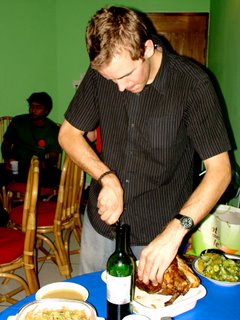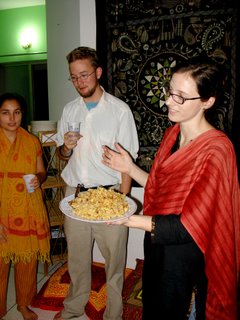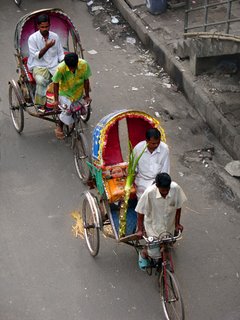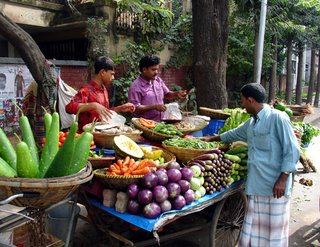Fulbright Blog
Date: November 30, 2006
Place: Dhaka
Some of you have been asking me about the food here, so I thought I would give you a brief overview of what I typically eat each day...
Breakfast
I usually have a few pieces of ruti (a flat bread that is a bit like a tortilla) with sliced banana and honey or sometimes yogurt drizzled with honey. Fatima makes the ruti fresh every morning... I also have one or two cups of tea.
Lunch
Normally I eat lunch at work at 1:00pm. For 20 taka (about 30 cents) a day I can have my lunch prepared by the office cook. Normally we have steamed white rice (bhat) and dal (literally means "lentils", but the dal at work is like lentil soup; I am not very fond of the liquid dal, so I don't eat it. I do like Fatima's thicker dal though...) Then the cook makes me (and me only!) a special shobji (mixed vegetables) made from onions and misti kumra (sweet pumpkin). Everyone also gets the main dish of the day which is usually a type of fish (mach). The fish are small, so they have many little bones (onek choto kata) which you have to carefully remove by rolling the fish between your fingers before you eat it. Normally I really like the fish, but sometimes she makes it with lots of chili peppers, so it is too spicy for me to eat. Sometimes they also have these little piles (?) of cookie-dough-consistency stuff that are made of various types of beans or potatoes. Often these are REALLY spicy though, so I tend to stay clear...
I eat lunch with my work colleagues which is very useful as they have taught me all of the Bangla food names that I know! Also, Bangladeshis eat with their hands. There is a little sink in the lunch room area that everybody uses to wash before they eat. Also, the plates are rinsed out with filtered water before we put food on them. Since Muslims use their left hand to wash after using the toilet, you are only supposed to serve yourself and eat with your right hand. The first time I ate with my hands it was a bit strange - I kept hearing my mother's voice say "don't play with your food!" - but after the first day or two it became natural...
Dinner
Fatima will come back to the apartment in the evenings to cook my dinner. Normally it is chicken in a curry yogurt sauce with rice and some type of shobji. Since I don't know how to cook and I don't know what types of Bangladeshi foods are available, my dinner menu is pretty much limited to the things that I know how to ask Fatima to make. I am hoping on increasing my dinner repertoire soon though!
Sweets
Bangla misti (or Bengali sweets) are very yummy. Most of them are some version of a doughnut-like cake that is soaked in sweet syrup. There is also another, dryer misti that I like that is white and has a slight pistachio flavor. I can't remember the name of it though... Fatima also makes this great thing called paesh. It is a rice pudding made with milk, rice, coconut, cinnamon, and raisins. It tastes a lot like the "rice and raisins" that Dad used to make when I was a kid and is simply delicious!!
Snacks
Since fresh fruit is so abundant here, I will normally have that for a snack. Pineapple and pomegranates are my favorite. This morning Fatima brought Hanako and I a new kind of fruit that I had never seen before (I forgot its name!) It looked like a small potato on the outside, but when you opened it up on the inside, it was separated into sections like an orange, with a few large black seeds that looked like pumpkin seeds. The fruit was orange in color, had the consistency of a kiwi and tasted like a fruit version of gouda cheese! (No kidding! It was quite bizarre! Hanako and I joked that it was "smoked fruit!")
All in all, I really like Bengali food. It is very rich, however, as everything is served with a curry sauce. I think that I need to teach Fatima how to make some "bland" dishes as well so that my tastebuds will not be overpowered!
Labels: Bangla Food
 They named the turkey "Hasina" after the head of the Awami League party. (If you recall from previous blogs, the Awami League is the one holding the blockade...) This is a picture of Steve carving up Hasina. Sadly, because she was such a small turkey, there was not much meat on her (and the meat she had was a bit tough...) Thankfully, Nabil also brought a chicken with him!
They named the turkey "Hasina" after the head of the Awami League party. (If you recall from previous blogs, the Awami League is the one holding the blockade...) This is a picture of Steve carving up Hasina. Sadly, because she was such a small turkey, there was not much meat on her (and the meat she had was a bit tough...) Thankfully, Nabil also brought a chicken with him!






